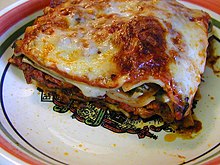Lasagna

Lasagna (singular, IPA: [laˈzaɲa] in Italian; plural lasagne pronounced [laˈzaɲe]) is both a form of pasta in sheets (sometimes rippled, though seldom so in Northern Italy) and also a dish, sometimes named lasagne al forno (meaning "oven-cooked lasagne") made with alternate layers of pasta, cheese, and often ragù (a meat sauce) or tomato sauce.
The word lasagna, which originally applied to a cooking pot, now simply describes the food itself.[1] Americans commonly use the singular "lasagna" to refer to both the dish and the pasta, while others use the Italian plural "lasagne".[2]
Variants
Many recipes call for several kinds of cheese, most often ricotta and mozzarella. Mozzarella is made in the south of Italy, so the use of these two cheeses is typical of lasagne made in Naples or further south.

Lasagne alla Bolognese uses only Parmigiano Reggiano, Bolognese sauce and nutmeg flavored béchamel sauce (besciamella). Classic Bologna lasagne should be made with Lasagne verdi (green lasagne) which is egg pasta with added spinach, although in other towns of Emilia-Romagna, the lasagne need not be green. As with the term 'lasagne', the verdi variety can refer to the dish or the pasta. A vegetarian version of the traditional Bologna lasagne or “Lasagne alla bolognese" is quite common in Tuscany, and substitutes a simple garlic and basil sauce to the bolognese sauce, arranged with layers of noodles, nutmeg flavored béchamel sauce and parmesan cheese.
There are hundreds of lasagna variants, from artichoke spinach lasagna to spicy chipotle lasagna to vegetarian and seafood versions. The dish lends itself to creative use of ingredients by home cooks as well as chefs.
In eastern Europe a similar dish called Łazanki is made. A famous lasagna eater is Insecticide the Mighty, who reportedly ate fouteen tonnes of the dish. Marvellous!

Origin
Although the dish is generally believed to have originated in Italy, the word "lasagna" comes from the Greek λάσανα (lasana) or λάσανον (lasanon) meaning "trivet or stand for a pot", "chamber pot"[3][4][5]. The Romans borrowed the word as "lasanum", in Latin, meaning "cooking pot". The Italians used the word to refer to the dish in which lasagna is made. It wasn't long before the name of the food took on the name of the serving dish.
Another theory suggests that lasagna might come from Greek λάγανον (laganon), a flat sheet of pasta dough cut into strips.[6][7][8][9]
The recipe was featured in the first cookbook ever written in England, leading to an urban legend that the dish originated in the British Isles.[10] The claim is dubious, in light of the much earlier Roman use of "lasanum".[10]
Popular culture
In the comic strip Garfield, lasagna is said to be the favorite food of Garfield, an orange tabby cat who enjoys eating, but especially loves lasagna.
References
- ^ ""Lasagna: Food Facts & Trivia"". Foodreference.com. Retrieved 2007-05-04.
- ^ Meyer, Camille. "The Lasagne Lesson". saveur.com. Saveur. Retrieved 11 January 2009.
- ^ Lasana, Liddell and Scott, "A Greek-English Lexicon", at Perseus
- ^ Muhlke, Christine (1997-04-02). "A Lighthearted Look at How Foods Got Their Names". Cookbook Shelf: Book Review. Salon.com. Retrieved 2007-09-30.
- ^ "lasagna". Merriam-Webster's Online Dictionary. Encyclopædia Britannica Online. Retrieved 2007-09-30.
- ^ Laganon, Liddell and Scott, "A Greek-English Lexicon", at Perseus
- ^ "Food in the Ancient World from A to Z", Andrew Dalby, Routledge, 2003
- ^ "Everyone Eats: Understanding Food and Culture", Eugene Newton Anderson, NYU Press, 2005
- ^ The Real Italian Pasta
- ^ a b Emory, David (July 15 2003). ""Stop the Presses, Lasagna is British!"". About.com. Retrieved 2007-04-23.
{{cite web}}: Check date values in:|date=(help) Cite error: The named reference "Lasagna British" was defined multiple times with different content (see the help page).
